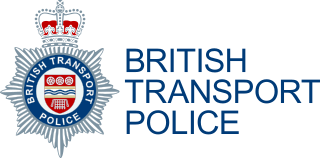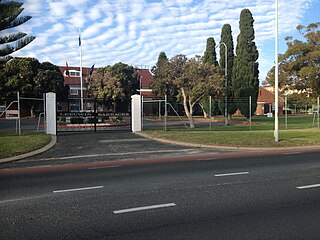Related Research Articles

Transport for London (TfL) is a local government body responsible for most of the transport network in London, England.

The British Transport Police is a national special police force that polices railways and light-rail systems in England, Wales and Scotland, for which it has entered into an agreement to provide such services. The force is funded primarily by the rail industry, and does not receive central government funding. British Transport Police officers do not have jurisdiction in Northern Ireland unless working under mutual aid arrangements for the Police Service of Northern Ireland, in which case any duties performed on a railway will be merely incidental to working as a constable in Northern Ireland.

Law enforcement in the United Kingdom is organised separately in each of the legal systems of the United Kingdom: England and Wales, Northern Ireland and Scotland. Most law enforcement is carried out by police officers serving in regional police services within one of those jurisdictions. These regional services are complemented by UK-wide agencies, such as the National Crime Agency and the national specialist units of certain territorial police forces, such as the Specialist Operations directorate of the Metropolitan Police.
Eve teasing is a euphemism, primarily occurring in Indian English, used for public sexual harassment or sexual assault of women by men. The name "Eve" alludes to the Bible's creation story concerning Adam and Eve. Considered a problem related to delinquency in male youth, it is a form of sexual aggression that ranges in severity from sexually suggestive remarks, brushing in public places and catcalls, to groping.
A police community support officer, or as written in legislation community support officer is a uniformed member of police staff in England and Wales, a role created by Section 38(2) of the Police Reform Act 2002, which was given Royal Assent by Queen Elizabeth II on 24 July 2002. They are non-warranted but provided with a variety of police powers and the power of a Constable in various instances by the forty-three territorial police forces in England and Wales and the British Transport Police.

Hollaback! is a nonprofit organization to raise awareness about and combat harassment, both online and in-person, through intervention trainings, a photoblog, and grassroots initiatives.
The Roads and Transport Policing Command, formerly the Safer Transport Command and Transport Operational Command Unit, is a unit of the London Metropolitan Police Service that polices roads, buses, bus routes, taxis and minicabs. It does not police national railways in London, London Underground, Docklands Light Railway or Tramlink, which fall under the remit of the British Transport Police (BTP).
The Epping Forest Keepers are an ancient and historical body of people who are employed by the City of London, who in return are responsible, on behalf of the Conservators, for the management and care of Epping Forest, which covers approximately ten square miles of forest, bridleway, woodland and recreational space stretching from Forest Gate in east London, north to North Weald in Essex. The forest is managed by the City of London Corporation and is one of many open spaces that comes under their control that is outside the Square Mile that are maintained by the Corporation of London at no expense to the tax payer.

The Public Order Act 1986 is an Act of the Parliament of the United Kingdom. It creates a number of public order offences. They replace similar common law offences and parts of the Public Order Act 1936. It implements recommendations of the Law Commission.
Harassment, alarm or distress is an element of a statutory offence in England and Wales, arising from an expression used in sections 4A and 5 of the Public Order Act 1986, which created the offence. The Act was amended in 1994.

In Singapore, crime rates are some of the lowest in the world. As of 2016, the greatest domestic vice concern remains as commercial offences over the Internet, with a 47 percent increase between 2014 and 2015.
Hate speech laws in England and Wales are found in several statutes. Expressions of hatred toward someone on account of that person's colour, race, disability, nationality, ethnic or national origin, religion, gender reassignment, or sexual orientation is forbidden. Any communication which is threatening or abusive, and is intended to harass, alarm, or distress someone is forbidden. The penalties for hate speech include fines, imprisonment, or both.

Operation Yewtree was a British police investigation into sexual abuse allegations, predominantly the abuse of children, against the English media personality Jimmy Savile and others. The investigation, led by the Metropolitan Police Service (Met), started in October 2012. After a period of assessment it became a full criminal investigation, involving inquiries into living people, notably other celebrities, as well as Savile.
The Everyday Sexism Project is a website founded on 16 April 2012 by Laura Bates, a British feminist writer. The aim of the site is to document examples of sexism from around the world. Entries may be submitted directly to the site, or by email or tweet. The accounts of abuse are collated by a small group of volunteers. The launch of this website is considered to be the beginning of fourth-wave feminism.
Rape in Egypt is a criminal offense with penalties ranging from 15 to 25 year and a lifetime sentence if the rape included abduction. Marital rape is legal. \By 2008, the U.N. quoted Egypt's Interior Ministry's figure that 20,000 rapes take place every year, although according to the activist Engy Ghozlan (ECWR), rapes are 10 times higher than the stats given by Interior Ministry, making it 200,000 per year. Mona Eltahawy has also noted the same figure (200,000), and added that this was before the revolution.

The Anti-Social Behaviour, Crime and Policing Act 2014 is an Act of the Parliament of the United Kingdom that consolidated and expanded law enforcement powers in addressing anti-social behaviour. One significant aspect of the act is that it replaced anti-social behaviour orders, the primary civil order in the United Kingdom since 1998, with criminal behaviour orders.

Project Servator police deployments were originally introduced by the City of London Police in February 2014 as "New policing tactics to deter and detect criminal and terrorist activity, as well as to reassure the general public. " Project Servator has since been adopted by British Transport Police, Police Scotland, Essex Police, Ministry of Defence Police the Civil Nuclear Constabulary and the Metropolitan Police. The police have used Project Servator tactics in London, on the national rail network and at the 2014 Commonwealth Games in Glasgow, V Festival and shopping centres.

A series of allegations concerning the involvement of British politicians in cases of sexual harassment and assault arose in October and November 2017. Allegations were prompted by discussions among junior staff employed in the UK Parliament at Westminster following the Harvey Weinstein sexual abuse allegations in Hollywood earlier in October, and the subsequent rise of the #MeToo movement, but spread further to cover all the major political parties, including political figures beyond Westminster.

Sexual harassment in the military is unwanted sexual behaviour, which is defined as threatening, offensive, or otherwise upsetting to others in a military setting. The behaviour is more common in the military than in civilian life. Women are substantially more likely than men to experience sexual harassment in the armed forces. Other groups at higher risk include child cadets/recruits and military detainees.
The Royal Canadian Mounted Police (RCMP) is Canada's national police force established in 1920 after the Cabinet moved to have the Royal North-West Mounted Police absorb the Dominion Police. The RCMP's primary mandate is to maintain "peace and order," and Officers provide police services to all Canadian provinces, excluding Québec and Ontario, as well as to the three Canadian territories, and more than 180 municipalities and Indigenous communities.
References
- 1 2 3 4 Martinson, Jane (22 July 2013). "Police act to halt sex harassment on London buses and trains". The Guardian . Retrieved 17 September 2014.
- 1 2 3 4 Bates, Laura (1 October 2013). "Project Guardian: making public transport safer for women". The Guardian . Retrieved 17 September 2014.
- 1 2 3 4 "Project Guardian". British Transport Police . Retrieved 17 September 2014.
- ↑ "Sexual offences". British Transport Police . Retrieved 17 September 2014.
- ↑ Topping, Alexandra (25 May 2012). "Four in 10 young women sexually harassed in public spaces, survey finds". The Guardian . Retrieved 17 September 2014.
- 1 2 3 Lo, Chris (19 August 2013). "Sexual harassment on public transport: not just London". New Statesman . Retrieved 18 September 2014.
- 1 2 Lo, Chris (15 August 2013). "Project Guardian: standing up to sexual harassment". Railway Technology. Cognitive Publishing Ltd. Retrieved 18 September 2014.
- ↑ Gardiner, Beth (31 May 2013). "Charting the Impact of Everyday Sexism Across the World". The New York Times . Retrieved 18 September 2014.
- 1 2 "Project Guardian" (PDF). Platform. British Transport Police. June 2014. pp. 4–5. Retrieved 18 September 2014.
- ↑ "16 arrests for sexual offences during Project Guardian week of action". Metropolitan Police Service. 18 March 2014. Retrieved 17 September 2014.
- ↑ "Railways sex offences rise by 21%". BBC News . BBC. 21 August 2014. Retrieved 18 September 2014.